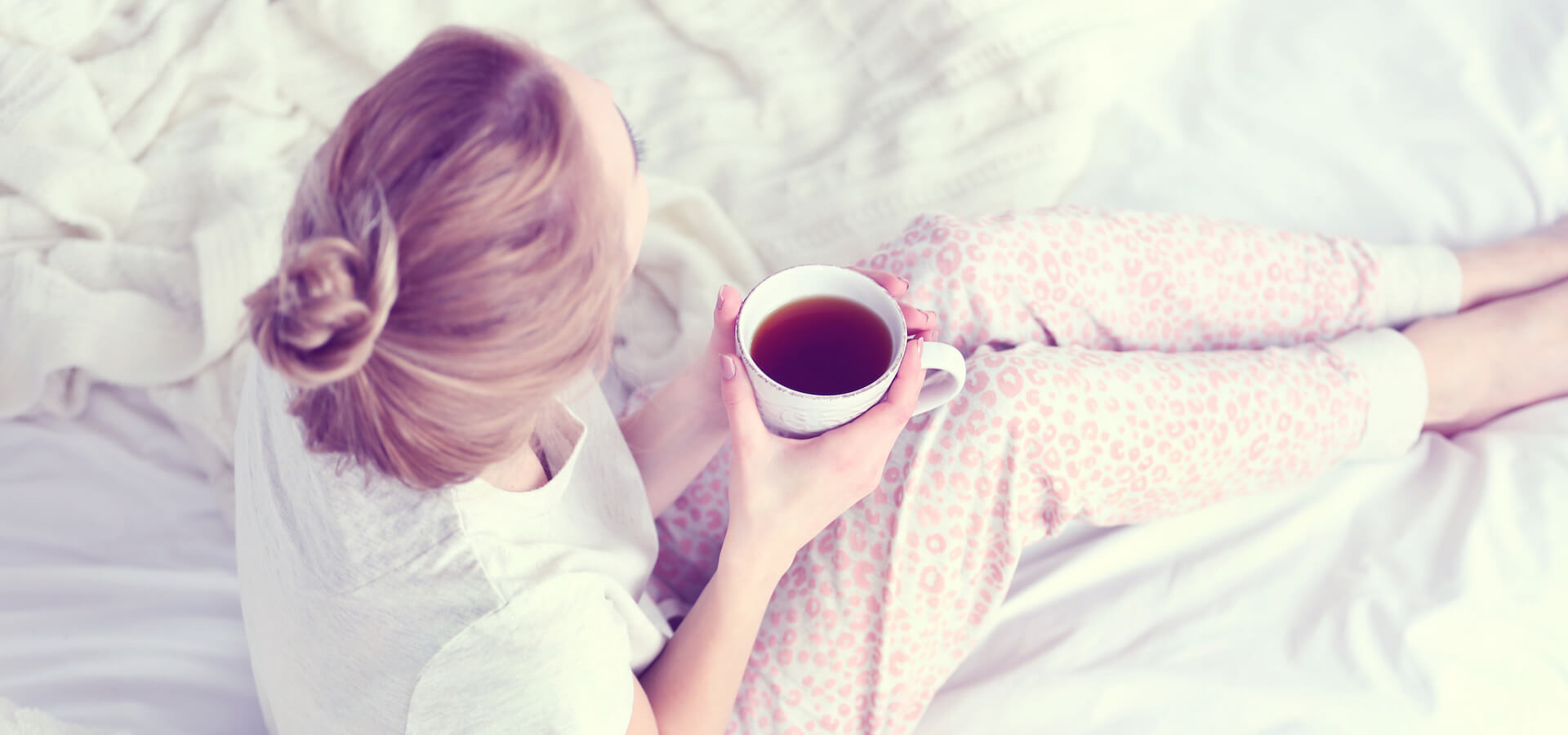Feeling stressed and finding it difficult to sleep? Whether you’ve just moved into a new home, you’re currently looking for somewhere to live, or you’re getting ready for a big move, the upheaval and stress of the situation can lead to difficulty initiating sleep or disrupted sleep.
Of course, adjusting to a new environment takes time, but there are some natural remedies, like teas that help you sleep, that’ll really do wonders for improving your quality of sleep.
Herbal teas, for example, can make an enormous difference to your sleeping cycle, calming the nervous system, relaxing muscles, and soothing your busy mind. The simple actions of boiling water, waiting for your tea to steep and inhaling the fragrant warm steam that rises from your cup can help you unwind, too.
But which is the best herbal tea for sleep? Here are ten to consider next time life’s concerns (or mountains of unpacked boxes!) have you feeling wide-eyed and wakeful come bedtime.

Topics in this article:
What to look for in a calming herbal tea for sleep
It’s easy to find calming sleep teas, but no two blends are exactly alike. Herbal teas for sleep tend to contain herbs that calm the nervous system, including hops, valerian, chamomile, passionflower, lemon balm and lavender. Some sleep tea blends contain a proprietary mixture of soothing herbs while others contain just one or two.
Whilst the chief aim of these herbal teas is to help you sleep, many of the best natural insomnia remedies offer some additional benefits. For example, catnip, chamomile, cinnamon and ginger can help with indigestion. Hops, passionflower and lavender soothe feelings of stress and anxiety.
A tea that has gained popularity in recent years – matcha – is packed with antioxidants including the powerful EGCg, and also boosts metabolism and burns calories. If you’re dealing with issues other than simple sleeplessness, you may find that your relaxing tea of choice helps in multiple ways.
The best teas that help you sleep
1. Catnip
Our feline friends feel frisky when given catnip toys to enjoy, but this minty herb does the opposite for us! Catnip contains an organic compound that promotes relaxation and a sense of drowsiness whilst reducing feelings of stress and anxiety.
It’s a popular ingredient in natural teas that help you sleep such as Sleepytime Extra. If you like, you can grow catnip at home and brew the fresh or dried leaves alone or design your own brew by combining them with other helpful sleep-inducing herbs.
2. Chamomile tea
Since ancient times, people have relied on chamomile as a sleep aid. This lovely little plant is a member of the daisy family, with unassuming white petals that surround a cheerful yellow centre. Chamomile’s sedative effect is credited to a flavonoid called apigenin, which binds to the brain’s benzodiazepine receptors and induces a sense of deep calm. If you’re feeling anxious, chamomile can help. Since it can soothe a variety of digestive ailments, it is also a good choice for those times when indigestion contributes to insomnia. Chamomile tea can also help relieve muscle soreness and achy joints. For example, if you have insomnia related to neck pain, you’ll want to give chamomile a shot. Add cinnamon or ginger if you prefer the taste of warm spices over the floral flavour of chamomile.
A quick word of caution: Choose a tea other than chamomile for sleep if you’re allergic to daisies, since it can bring on an unpleasant reaction.
3. Cinnamon tea
With a warm, comforting flavour and a touch of natural sweetness, cinnamon eases digestion whilst promoting a sense of relaxation. If you enjoy the taste of cinnamon, you can extract its flavour by simmering a cinnamon stick for about fifteen minutes, or you can purchase a soothing tea with cinnamon as an ingredient. If you decide to make your own cinnamon sleep tea, consider adding other warm herbs such as ginger and cardamom. Sweetened with honey or by itself, this simple bedtime tonic will help you drift off to sleep when digestive issues are troubling you.

4. Ginger tea
When you’ve eaten something that disagreed with you and tummy troubles are keeping you awake, you might find it helpful to reach for ginger tea. Ginger’s anti-nausea effect has been widely studied. It can help with bloating, too. If you happen to have fresh ginger root on hand, simply steep a few slices in boiling water and drink it. For greater convenience, consider a ginger tea blend that contains other digestive herbs like fennel, liquorice or cardamom.
5. Hops
Hops gives beer its signature flavour, and it’s also responsible for the sense of relaxation many people notice a short time after enjoying a pint. Studies have shown that hops inhibit the central nervous system, providing a noticeable sedative action. Since the flavour of hops is quite bitter, this soothing herb is usually blended with others to assure a more agreeable taste.
6. Lavender tea
If you choose a sleep tea with lavender, you might feel yourself relaxing almost as soon as you inhale the steam from your cup. Lavender’s benefits include decreasing blood pressure, lowering heart rate slightly and calming the mind when you’re feeling stressed or anxious.
7. Lemon balm tea
Also known as Melissa officinalis, lemon balm has a delightful flavour that makes it a valuable addition to herbal sleep teas. Not only does lemon balm taste delicious, it has been proven to offer a calming effect, particularly when combined with valerian.

8. Magnolia bark tea
Sometimes called Hou Po, magnolia bark has been used in traditional Chinese medicine for hundreds of years. Besides easing nervous tension and anxiety, it is a valuable addition to any tea for sleep. It has been studied for relieving menopausal symptoms as well. If hot flashes are part of the reason you’re suffering from insomnia, this may be one of the most important ingredients to look for when deciding on the best herbal tea for better sleep.
9. Passionflower tea
Passionflower is traditionally used to ease anxiety, and it has a good reputation for use as a natural sleep aid, particularly in cases of interrupted sleep and general restlessness. Because passionflower’s calming effects are often more pronounced when it is combined with other herbs, it is often found in sleep tea blends that also contain hops, valerian, or lemon balm. Some relaxing night time teas contain several of these herbs.
10. Valerian tea
For those times when you feel like something stronger, consider a herbal tea with valerian. This natural sleep aid is powerful – so much so that it is sometimes used to help people with sleep disorders get the shut-eye they so desperately need.
Valerian has a mild sedative effect, and studies suggest that it helps people fall asleep faster whilst improving sleep quality. Where pharmaceutical sedatives often come with warnings about potential side effects, valerian is generally considered a good alternative with a lack of side effects.

How to brew herbal teas
If you’re in a bind, you can simply boil water, pour it into your favourite mug, and add your tea bag or pop in a tea ball filled with the loose-leaf blend of your choice. If you’d like to brew the strongest cup of bedtime tea possible though, you might want to consider taking a few extra steps.
Start by boiling water. Next, check your tea’s label for the proper steeping time and temperature. If you steep it too long, it might take on a bitter flavour. If you take the tea ball or bag out of the cup or pot too soon, your tea won’t offer as much strength. Teas made with leaves and flowers typically need to steep for ten minutes, whilst those made with roots, berries or bark take about 20 minutes.
Cover your tea while it steeps so that the aromatic constituents stay in the blend instead of evaporating. A teapot is perfect for steeping, but you can simply place a saucer on top of your cup if you prefer.
When the tea has finished steeping, squeeze the excess water from your teabag or ensure that your strainer has time to drain any excess liquid back into your cup. Add a touch of natural sweetener such as raw honey if you like, then relax and sip.
 Winding down with a cup of tea can be a handy ritual to help you cope with stress signalling that your busy day has come to a close. Make relaxing bedtime teas part of your nightly ritual and over time, you’re likely to find that you sleep a whole lot better.
Winding down with a cup of tea can be a handy ritual to help you cope with stress signalling that your busy day has come to a close. Make relaxing bedtime teas part of your nightly ritual and over time, you’re likely to find that you sleep a whole lot better.
Rest well!
A quality mattress can also be the key to a comfortable night’s sleep, check out our mattress buying guide if its time to get a better bed.





Yes, all these blends are excellent to help you doze off! Just remember that every plant can have a different influence on each person. So, make sure that the tea you are drinking works for you.